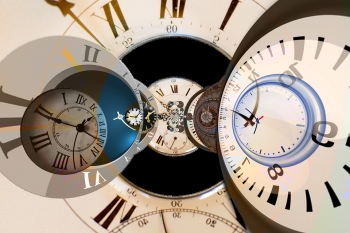Psychology of Time

Various aspects of time – whether it is absolute or relative, real or unreal, etc – have been discussed in some detail in the sections on Philosophy of Time and Physics of Time. Here, however, we turn to matters of how an individual experiences and perceives time, and here things become even less definite and concrete.
Time perception refers to the subjective experience of the passage of time, or the perceived duration of events, which can differ significantly between different individuals and/or in different circumstances. Although physical time appears to be more or less objective, psychological time is subjective and potentially malleable.
The biopsychology of our perception of time is a fascinating but little understood area of psychology and neuroscience. It looks at the way our brain processes time and time intervals, and the brain’s built-in expectation of the order and speed of events, as well as the field of mental chronometry.
Most organisms have an internal sense of time generated by endogenous biological clocks, completely independent of ambient temperatures, sunlight, etc. The best known of these is the circadian clock, which maintains daily biological rhythms and regulates sleep, hormone production, etc, but there are also other peripheral biological clocks, some of which follow ultradian or infradian rhythms. A whole field of chronobiology has grown up to exploit our increasing knowledge of these biological rhythms.
Temporal illusions are distortions and misperceptions of time that arise from a variety of psychological and other causes. The most commonly encountered examples are the effects of ageing and psychoactive drugs on time perception, but there are several other interesting effects, such as the kappa effect, the stopped clock illusion, the oddball effect, etc.
Chronophobia is the fear of time or the passing of time, a specific and well-documented psychological phobia which principally affects the elderly and those incarcerated in prisons.